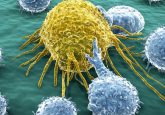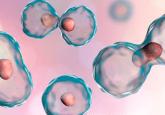Trace levels of CTCs could spot early signs of prostate cancer treatment ineffectiveness

A study has found that evidence of circulating tumor cells (CTCs) in blood samples (taken in the first 12 weeks after starting treatment with abiraterone or chemotherapy) is associated with worse overall survival outcomes later on for advanced prostate cancer patients. The findings were recently published in Annals of Oncology.
There is an unmet clinical need for treatment and surrogate biomarkers for advanced prostate cancer care; in this study the investigators aimed to determine the value of any increase in CTCs as an indicator of progression in prostate cancer patients with low pre-treatment CTCs.
“At the moment assess in the clinic how men with advanced prostate cancer are responding to their treatment. Measuring the levels of CTCs in blood samples could be a relatively quick and effective way to test men in the first 12 weeks of treatment,” study lead Johann de Bono (Institute of Cancer Research and The Royal Marsden NHS Foundation Trust, both London, UK), commented.
You may also like:
The study included over 500 advanced prostate cancer patients (with baseline CTCs <5) treated in the COU-AA-301 (abiraterone or placebo + prednisone) and IMMC-38 (chemotherapy) trials.
Increases of just a few CTCs per blood sample indicated much shorter survival times, compared with when no CTCs were detected.
“Our findings show that any increase in prostate cancer cells circulating in the blood could identify patients with significantly poorer chances of survival, even at tiny levels, and could be used to guide treatment,” concluded.
In the future, the test could be used to help to rapidly assess how men with advanced prostate cancer are responding to treatment, and whether they should switch to alternative therapies. The investigators stress that these findings must be prospectively validated.
Sources: D Lorente, D Olmos, J Mate, et al. Circulating tumour cell increase as a biomarker of disease progression in metastatic castration-resistant prostate cancer patients with low baseline CTC counts, Ann. Oncol. https://doi.org/10.1093/annonc/mdy172 (Epub ahead of print)(2018); www.icr.ac.uk/news-archive/tiny-changes-in-prostate-cancer-blood-test-could-spot-early-warning-signs-of-treatment-not-working





